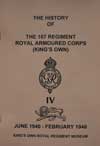 |
King's Own Royal Regiment Museum Lancaster |
||
|
HOME Museum & Collections Soldiers of the Regiment Sales Donations Events Contact Us REGIMENTAL HISTORY 17th Century 18th Century 19th Century 20th Century First World War Second World War Actions & Movements Battle Honours FAMILY HISTORY Resources Further Reading PHOTO GALLERY ENQUIRIES FURTHER READING LINKS |
Regimental History - Second World War 107th Regiment Royal Armoured Corps (The King's Own) 1944-45. Following their withdrawal from France in May 1940 the 5th Battalion King's Own switched to a defensive role in anticipation of a German invasion whilst the newly created 10th Battalion undertook a similar duty on the Northumberland coast. In late 1941 these battalions, were converted to tanks and became part of the Royal Armoured Corps and eventually were merged and became the 107th Regiment Royal Armoured Corps, (The King's Own). The men of the 107th were constantly training for the planned offensive in France, and in the early part of 1944 their Churchill tanks were supplemented by a number of 'Stuarts', a light American tank, as replacements for the bren-gun carriers in the reconnaissance platoons. In May, waterproofing of the vehicles was carried out in preparation for their movement to France but it was not until 20th June that the vehicles were moved into marshalling areas to go across the Channel. The allied advance following the landings in Normandy on 'D Day,' 6th June, had fallen behind schedule, and this factor combined with bad weather resulted in the arrival of the 107th in Normandy as part of the 34th Independent Armoured Brigade being delayed until 3rd July. On 25th July the Americans broke from their beach-head and the major advance across France got underway. The 107th were involved in the Battle of Caen, at Hill 112 near Esquay, south west of the City and following heavy fighting at Grimbosq and Brieux on the 7th and 8th August crossed the River Orne and concentrated to the west of Falaise for reorganisation. An entire squadron from the 153rd Regiment RAC joined the 107th as the former was disbanded. From Falaise the Regiment crossed the River Seine and moved to Le Havre where they assisted the general assault and liberation of the Port. The Regiment was out of action whilst the airborne landing took place at Arnhem, but as the army group advance through Belgium and Holland the 107th had the vital roll of protecting the over-stretched supply corridor, and moved to Eindhoven to support the 53rd (Welsh) Division on the west of the corridor. On 20th October operations against the port of Antwerp began and in nine days of heavy fighting 19 tanks were put out of action. Weather conditions began to slow the Allied advance, but the end of the war was in sight and once Antwerp had fallen the port could be used to supply the Allied advance which greatly improved the situation. A combination of severe weather and mud caused the suspension of activities during December 1944 and January 1945 but on 8th February, after five hours of artillery bombardment and by now under the command of the 51st Highland Division, the regiment took part in the attack on the Siegfried Line in the Reichswald area. After three weeks of heavy fighting the area was cleared and the Regiment stood down and moved back into Holland for a fortnights rest. 34 Tank Brigade was placed in Second Army Reserve for the Rhine Crossing on 24th March, but was not required and the 107th did not cross the Rhine until 7th April and, until the war ended on 8th May, took part in internal security duties at Bocholt and, later, Munster.
Photographs of the 107th and 151st Regiments can be found in the Photo Gallery.
|

